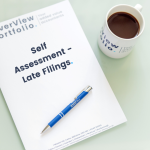Reasons to file your tax return early.
If you need to file a self-assessment return – hopefully you know by now!
We have covered off in previous blogs who may be required to complete a tax return each year, but the general principle being that if you have income from sources that don’t have tax deducted directly, are self employed or company director, have income from property or other investments, or earning over £100k per annum – you are likely to need to do one.
The Self-Assessment tax return must be completed annually, and the deadline for submitting the tax return online is 31st January following the end of the tax year.
We see so many people putting off filing, there are, however, several reasons why filing well before the deadline is beneficial.
Benefit your mortgage or remortgage application.
If you are planning to buy a house or remortgage your existing property, you are typically required to prove your income by providing an SA302 and HMRC Tax Year Overview.
These documents will show how much income you have declared to HMRC and provide lenders with the information they need to progress your application.
Lenders typically want the most recent income figures to be within an 18 month period, so if you haven’t filed your return for the previous year before 5th October, it’s likely that your last filed return will be classed as out of date.
This will also apply to other forms of finance you may be looking to raise
More time to plan and save for your bill.
Although you may choose to file your Self-Assessment early, your tax bill still isn’t due until January 31st – it’s a common misconception we see that if you file you need to pay the tax at the same time, that’s not the case.
The closer you file towards the deadline the less time it gives you to sort out paying the tax if you haven’t been making the right provisions along the way.
Late payment means interest being applied to the tax due and payment penalties can also be applicable the longer that the money remains outstanding.
HMRC do offer time to pay arrangements which can be sorted directly with them online, but they want to ensure that you have exhausted all other possible items first.
Avoid penalties.
Speaking of penalties, filing past the 31st January will mean that you automatically get the £100 late filing penalty, which increases the longer your return is outstanding.
We have written a blog that covers off what late filing penalties apply, take a read here INSERT LINK
Claim your refund.
If you are due a refund, you don’t need to wait until 31st January to claim it.
Your money is better with you right? If you think you may be due a refund, the earlier the return goes in the earlier this should come back to you.
We are not miracle workers
If everyone left their return to the last minute, you wouldn’t get it filed.
Over the years we have had a number of occasions where we have pulled rabbits out of the hat, but filing late or on the deadline day only means you are ticking your compliance box – that isn’t the best way to manage your affairs or for us to make sure we can give you the best value and support.
The earlier you file doesn’t just give you the benefit of the piece of mind that it is done, but also means that there is a more structured and supportive approach to your future planning.
How can we help you?
Rather than you just picking your return up once a year and trying to navigate through the HMRC filing system our team work on and file returns all throughout the year, every year. This covers a wide range of scenarios and planning with clients.
We are always happy to discuss the various ways our team can help you with your submission. If you have anything you would like to discuss with a member of our team, we invite you to contact the team today.
#selfassessment




